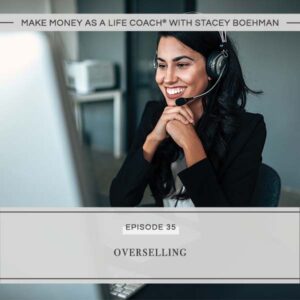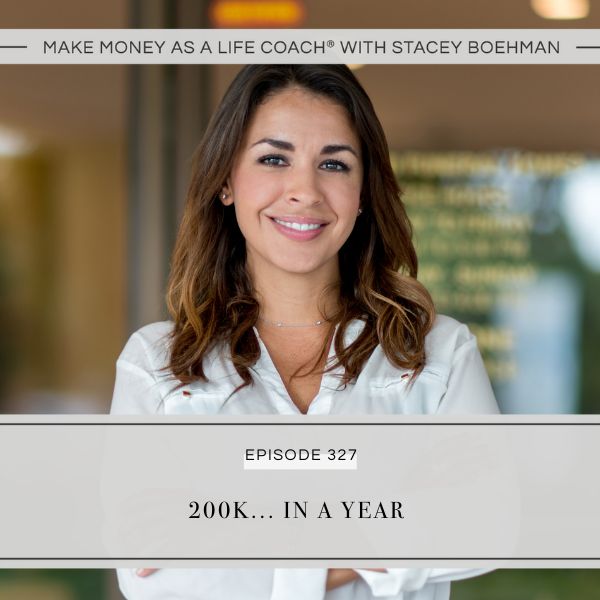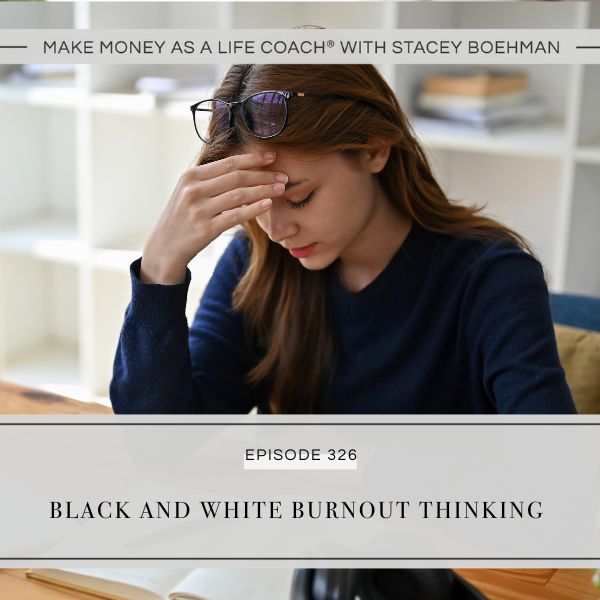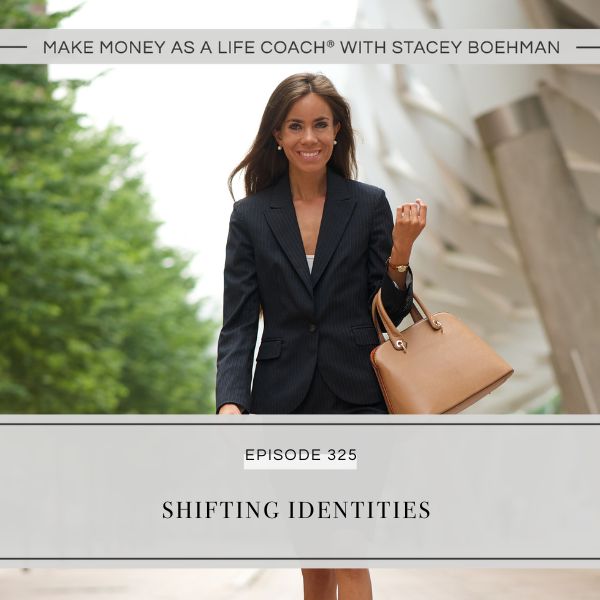 We’re diving into the concept of overselling this week because it’s something all of us go through at some point on our journeys as entrepreneurs and coaches. When we’re lacking the confidence and belief that clients are out there waiting to buy, or that we’ll ever make the kind of money we want, overselling becomes our go-to method in trying to attract clients.
We’re diving into the concept of overselling this week because it’s something all of us go through at some point on our journeys as entrepreneurs and coaches. When we’re lacking the confidence and belief that clients are out there waiting to buy, or that we’ll ever make the kind of money we want, overselling becomes our go-to method in trying to attract clients.
I’m giving you a spectrum of examples today of how I see overselling happen with my clients, as well as a recent incident where I was called out on overselling. Objections are bound to happen when you’re on a consult, and I teach all about overcoming objections in 2K for 2K, but hustling the sale is definitely not the way to go.
Join me this week as I take you through the ways in which you might be overselling but can’t see it for yourself, and how you can start to practice selling in a way that feels not just good to yourself, but to your clients too. Articulating your value doesn’t have to be aggressive or feel like you’re badgering your potential client, and I’m sharing some practices that will help you nail your sales.
All through the month of August, we’re doing a course called Making Money with the Model. It’s five weeks of applying the model to the math of making money. Click here to join!
What You’ll Learn from this Episode:
- What overselling feels like.
- How I’ve seen overselling show up for my clients and myself.
- What you’re lacking when you oversell.
- How I’ve seen sales turn from a yes to a no because of overselling.
- Why developing social awareness is the key to selling.
- How I’ve gauged how to write my copy and marketing.
- What to practice to articulate the value of your services better.
Listen to the Full Episode:
Featured on the Show:
- Join my 2K for 2K program where you’re going to make your first $2000, the hardest part, and then $200,000 using my proven formula.
- Follow me on Instagram!
Full Episode Transcript:
Welcome to the Make Money as a Life Coach® podcast where sales expert and master coach Stacey Boehman teaches you how to make your first 2K, 20K, and 200K using her proven formula.
Hey my coach lovies. Welcome to episode 35. Today we’re going to talk about overselling. But first, y’all know what time it is. I got to shout-out a client. Mara.
In July she posted in 2K for 2K – I’m a little behind. We have a stack of testimonials at this point so I say just posted and it may have been a month or two or three, but I’m going to get to all of them at some point. Mara said, “Well July, you hot sweaty month when everyone’s on vacation, you didn’t hold back my beliefs. You had nothing on my fire. July equals $24,000 in new sales so far and my belief is there’s more coming. I have five more consults before the 31st. Let’s do this.”
And then she updated to say, “Now we’re at $28,000 for July. And my belief is there and more is coming. #ChristmasinJuly. Thank you, thank you Stacey. Thank you for showing me what’s possible. This is the easiest money I have ever made and the most fun ever that I’ve had in my business.”
Mara, that’s so exciting. I absolutely love that for you and I love how fun your post was. Listen, we have a lot of fun in 2K for 2K. These are the kinds of posts that I love. I love when people bring their personalities. This isn’t just some stuffy program where you’re like, hey, I made my 2K back. We celebrate, and we celebrate it with our personalities and with a little bit of fun and spunk. That’s my jam.
Alright, also can I just celebrate myself for a minute? For just a hot second. I am killing it on Insta story. Are you on Instagram? Let’s be friends. @staceyboehman. And I want to say this because Instagram was not my thing for a very long time. I, first of all, practice constraint so I don’t do a ton of different social media options, social media platforms. I do one. I commit. I go all in.
And Facebook has become more of posting random stuff and being more engaged as a human and I don’t do it very often, but I do like to get on there and just see what my friends are up to on and off and give myself a little bit of time to just kind of play around on there. But Instagram now, I really think about that as my business platform, and I show up there for my business and I do give some personal stuff. I do post some personal things.
I did a tour of my before and after, after cleaning out my closet again and rearranging it the other day, and I’ve been posting puppy pics. So much fun. But mostly, I’ve been posting and especially in Insta story, business stuff like client celebrations, I share when you guys post about the podcast. I re-share that on my story.
I found a way for it to resonate with me because I’m kind of an introvert and my intention really in my business is to be working three days a week. And I don’t want to feel consumed by this whole becoming a social celebrity like, that is not my jam. I don’t want any part of that.
I want to spend my time thinking about concepts, creating content for my clients, and new ways to teach them at a higher level. I want to coach my clients, and I want to think about my business as the CEO. And then I want to spend time in my personal life being fully engaged and I don’t want to be thinking about oh, let me snap a photo of this or let me capture this on my Insta story.
I don’t want to think about that. I just want to be really present when I’m out to dinner with friends or when I’m at the movie or dinner with my fiancé, whatever we’re doing from hanging out with family, I want to be there.
So I just wanted to say this to say whatever social media platform you’re using, if you’re using a social media platform, not that you need to in any way, but if you are, I just know a lot of you struggle with how to make it resonate with you and I want to offer to keep trying. You don’t have to work on it every single day, but you can find a way to make it resonate with you because I have done it.
And Insta story has been hot for a while and I was like, no, I don’t want any part of it, but now I’m loving it. I don’t spend that much time on it but what I do put on there feels really good for me so make social media work for you. Don’t work for it. Maybe I should do an entire podcast about that. Do y’all want to hear a podcast about that? Hit me up on Instagram and tell me if you want an entire podcast about social media when it comes to building your business. I will do it for you.
Alright, so let’s dive in. Let’s talk about overselling. Overselling is when you sell too much. That’s the simplest way to explain it. When you sell too much. When you push too hard and convince. It will feel to you like leaning in, like chasing, like arguing, like trying too hard. Overselling is like overcompensating.
So it’s like making up for something you lack. And what I think you lack when you oversell is confidence in yourself, your offer, in your client, or all three at the same time. And many of you – I’m going to give you an example, like we’re going to laser this in on one specific thing – many of you do this when you get objections on consults.
So instead of coaching your client, instead of staying in your power and asking good questions, you start convincing. And you’ll know you’re doing this because you will be the one dominating the conversation, and you’ll be doing all the talking, and you’ll be doing a lot of explaining. You’ll be telling your clients what their thoughts are instead of asking them what they are.
You’ll be telling your clients why they should buy instead of figuring out why they’re giving you the objection. That’s what I do when I’m feeling confident in myself, my clients, my services. I’m figuring out why they’re giving the objection. The objection, the words they say are neutral, and people have different reasons for giving them.
So for me, I’m thinking are they giving this objection because no is hard for them to say, they don’t know how to tell me no, or they don’t want to tell themselves no, even when that’s their truth, or they don’t even know that that’s truly their truth. They’re not really aware that they are a no. Are they just saying no because their brain doesn’t feel like doing something hard? Like figuring it out and deciding in that moment? We don’t want to make decisions, most of us.
I’ve been onto myself lately actually about how often I don’t want to make a decision and I’ll say I’m going to come back to that. Really interesting. This is something I’m working on in my own coaching. Or do they want to be a yes but they’re in their own way having a thought or believing their circumstance defines them?
This is the type of conversation that happens when you’re coaching. And remember, good selling is coaching. But also let me add a caveat. Good selling is coaching that you have permission to give. Otherwise, it’s you giving your client your thoughts, trying to make your client believe in something that they don’t. That’s overselling. When you don’t actually have permission to coach them in that moment on their decision. You have to ask for that.
I think you should ask for that. That is what I do. That’s what I teach my clients in 2K. Instead of just telling them they have an objection and going into overcoming their objection, or what I see a lot of sales coaches teach is just canned responses to an objection. So I hear you, and you go and you give them all the reasons their objection is wrong.
I don’t recommend doing that because truthfully, when you’re on the consult with someone, you don’t know why they’re giving that objection unless you explore it with them. But when you’re overselling, instead of exploring it with them and having them do the work of thinking about their own decision and thinking about their brain and seeing their brain, it’s you doing all of the work for the sale. You’re not meeting the person halfway. You’re hustling for the sale.
I like to explain selling like two people in a dark tunnel. The best sales call is when you stay on your side of the tunnel and give clear directions and powerful coaching to direct your client to the other side. You can even go as far as meeting them in the middle. But what many of you do when you’re first trying to learn to sign clients is you go after the client to the other side of the tunnel, to their side. You try and grab their hand and aggressively walk them to the other side.
You’re like, hand in hand, okay let’s just do it together. It’s you hustling and doing all the work. You’re overselling. And I teach my clients to be willing to risk the relationship on a consult, but I think you have to have both sides of that coin. You also have to be equally willing and open at any given moment to release the reins.
So risking the relationship doesn’t mean badgering them, pushing them beyond where they’re willing to go, convincing them. That’s not what risking the relationship is. It just means coaching hard but if they’ve given you permission to do that. So let’s go back to going to your client’s side of the tunnel for a second.
The reason we do this, the reason we oversell comes from lack of confidence, or believing you are right, which I think is overconfidence. So there’s lack of confidence and overconfidence, which is also still lack of confidence. When you go overconfident, it is because there is a lack of confidence and to compensate, you go over on the other end of the spectrum, but it’s still a confidence issue.
And I think it’s important to know that on the consult, this lack of confidence isn’t because your potential client said no or gave you an objection. The no just triggers the insecurity you already have. And here’s how I know this, which I think is really interesting is I see a lot of people do this overselling thing after the client has said yes and agreed to buy because the client is just a circumstance, right?
So no matter what they do, if you feel insecure and aren’t aware of it, it will show up somewhere. Even when you get the yes. It’s fascinating. So what this looks like, continuing to sell, overselling after you get the yes is continuing to talk about the benefits and the features after they’ve said yes, like you just keep selling them.
Or sending them lots of emails before they start, telling them how pumped you are for them to start, keeping the contact going. It comes from fear of they won’t just show up for the first call if you leave them alone. And I remember having that feeling like oh my god, what do we do? There’s a week before the call, I can’t possibly just not speak to them and they’ll just how up to the call, but they will.
It’s really fascinating. And I think this comes from not even – almost like you don’t believe their initial yes. When I see this example when it happens this way, I can’t believe they said yes. How many of you have said that? We get that all the time in the 2K page. People will sign clients and they’re like, I can’t believe it.
It’s interesting if you make money and then you can’t believe you made money. You should investigate that. Because then what happens is you’re unsure about their yes, you then try to make sure they’re a yes. And I’ve seen people turn yes’s to no’s this way. It really makes your client go, huh? Your lack of confidence becomes so obvious.
So this actually recently happened to me. It’s what made me think about this as a concept and think about teaching this to you. I went to Lululemon to return something I ordered with my fiancé. And I just meant to maybe get one thing, this new print they had back in stock that I love, and I had told myself when it went out of stock I will get that if it ever comes back in stock.
So I was honoring my word. But four other pairs of pants later and a workout jacket, we’re ringing it up and if you guys go to Lululemon, you know how expensive they are. It was like a $500 bill. And my fiancé said nothing but I had all the thoughts in the world, and so I kept selling him on why it was totally great that I was getting this and why it was fine, why it was okay.
And I can’t remember now what I was saying to him but I just kept selling him on the fact that we should totally get all these things from Lululemon. But what was the funniest thing is that the lady ringing up the pants finally got tired of it and said stop selling him. The receipt is in the bag. You have the clothes.
And I died laughing. I realized in that moment how hard I was working to make sure Neil knew it was a really good purchase because deep down, I was the one that was insecure about the purchase. I was sitting there thinking about my overflowing drawer of Lululemon pants, knowing good and well I didn’t need any more.
And so I was the one that needed selling on my decision or commitment to my decision. I didn’t have it so I kept selling him. It was so amazing for the cashier to notice that and call me out on it. It was fabulous. And I was thinking, how many people do this with coaching? This happens all the time.
So many of you are overselling, of course because you have your thoughts about what’s happening. And one more thing that the Lululemon situation presented to me is that overselling also comes in the form of rationalization because that’s what I feel like I was doing with Neil is I was rationalizing why it was fine that we were spending the money at Lululemon and really, truly, the amount of money we spent was neutral and it was fine. We have the money.
But my insecurity had me start rationalizing to myself and then to him. So when you rationalize, for example, emailing your client to check in when they haven’t made their payment, you’re like oh, maybe they just forgot that they were supposed to pay in 48 hours. Or maybe they just need a little nudge. Some of you tell me this. They just need a little nudge.
But really what’s happening is you don’t feel confident they’re going to pay you, so then you go in and remind them that they haven’t made their payment. In that moment, you are overselling. Another way overselling shows up, I’ve seen this a bunch recently as well. This is also why I love to scroll on Facebook. I get so much amazing content from watching coaches just be coaches online.
Overselling also comes in the form of constantly telling people how amazing your offer is. So I see this a lot in copy, like in emails, in posts, in live streams. Using a lot of exciting words like epic, powerful, transformational, game-changing, life-altering, mind-blowing, unforgettable. Y’all, that’s how the circus sells tickets. Not how you sell life coaching.
But seriously, your opinion doesn’t matter to your clients. And the more opinion you give, the less confident you look. The more you dress it up, the more fake it feels to your clients. I don’t recommend being in your clients’ thoughts in a way that doesn’t serve you, thinking they’re going to hate it or I’m emailing them too much. But I do think when it comes to selling, you should kind of develop some social awareness by even asking yourself how you would feel receiving an email like that.
That’s the way I’ve gauged how to write my emails and what I would want to receive and what I wouldn’t. And I get annoyed at emails that are overly emphasizing how amazing something is. I just think your clients don’t want to hear what you think about something you’ve created. They want to hear what matters to them, what’s in it for them, what you’re going to help them do, what this email is going to help them do, what results they’re going to get.
They want to know something about their problem. Not how amazing your program is. And if you can’t explain the value of coaching in any other way, other than exaggerated adjectives of amazingness, they aren’t going to buy. And I see this happen because you haven’t practiced articulating the value of what you do enough.
So instead of saying your program is going to be life-changing and epic, tell them why exactly. You have to be able to explain your clients’ problems to them better than they understand it themselves, and their problem in their mind is not that they’re missing epicness in their life. It’s that they overeat on vacation or yell at their kids or hate their boss. Whatever your niche is.
They need to hear why they have the problem they have, how you will help, and why it hasn’t worked before. You can cut out all of the adjectives describing how amazing your program is and just tell them that and they will think all of those adjectives about your work on their own. They’ll fill in the blank and think it’s amazing and epic and life-changing.
You don’t need to do that. That’s overselling. So this week, I want you to just notice how often you are overselling. Notice when you’re chasing or convincing a client in your copy, in your emails. When I say copy, just the shit you write on Facebook. Notice when you think that you have the answer for them, that they should sign up with you and they shouldn’t have an objection. Notice when you want it more than they do, and for you, not for them.
And then I want you to work on your confidence. True confidence that comes from staying on your side of the tunnel. And not believing that your client should come to the other side, but if they want to, you can tell them how to do it. Think about how different that feels. I really think that the best selling cocktail, if it were a cocktail is sufficiency, you have everything you need, plus coaching your client for them directed by them, plus a splash of really good questions that come from curiosity with a garnish of willing to risk it all but not being tied to anything.
That’s the selling cocktail. Alright, get out there and sell but don’t oversell. I’ll see you next week.
Hey, if you’re ready to make money as a life coach, I want to invite you to join my 2k for 2k program where you’re going to make your first $2,000 the hardest part using my simple 5 step formula for getting consults and closing new clients. Just head over to www.staceyboehman.com/2kfor2k. We’ll see you inside.







